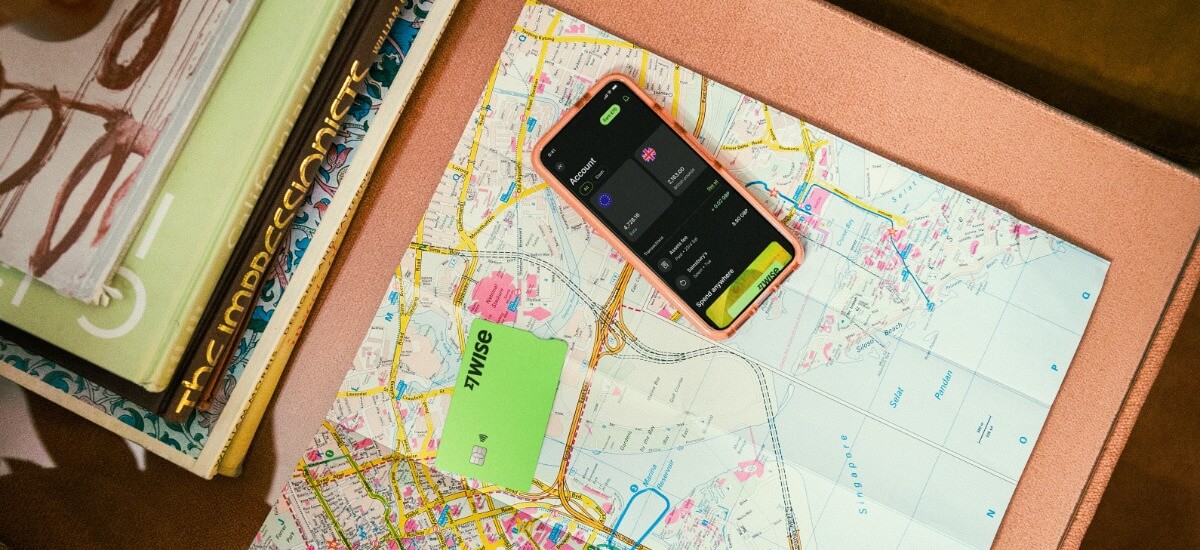How much is a security deposit? 2025 guide
Everything you need to know about security deposits

Many American expats want to move to the Philippines to enjoy its warmer climate, beautiful beaches, and cheaper cost of living compared to the US. In major cities, you can also find all of the conveniences you need, such as shopping malls and restaurants.
That said, there are special rules and restrictions you need to understand before buying a house in the Philippines. Here's everything you need to know.
We’ll also introduce Wise, an easy way to send money to the Philippines or spend in PHP without foreign transaction fees — even for large transfers.
| Table of contents |
|---|
Americans can buy property in the Philippines, but there are unique restrictions when it comes to buying a house specifically.
You can own condominium units (as long as Filipinos own 60% of the units in the building), houses, and buildings. However, foreigners can't own land in the Philippines.¹
This means that if you want to buy a house or villa, you'll be able to buy the building, but you won't be able to buy the land that the building is standing on. Naturally, this makes buying a house in the Philippines more complicated than in the US.
If you don't want to buy a condo unit and are set on owning a house, there are possible workarounds, such as leasing the land or buying it through a corporation.
If this is something you're considering, make sure to work with a qualified local professional who can guide you through the process.
| 💡 Keep in mind that buying a house doesn't mean that you can move to the Philippines permanently. To do that, you'll need to secure residency. |
|---|
Many expats use investment-based visas, such as:²
Special Investor's Resident Visa (SIRV): Requires a 75,000 USD bank deposit, which you can later invest in Filipino businesses
Special Resident Retiree's Visa (SRRV): Options range from 20,000 USD (over 50 with pension) to 50,000 USD (under 50 without pension)
There are also other types of residency you can get, such as through marriage to a Filipino citizen.
For many Americans, buying a house in the Philippines can be a great investment. That said, there are also important cons to consider.
Pros:
Affordable prices: Property costs much less than in most Western countries, especially outside of major cities. You can get a luxurious beachfront property for much cheaper than you'd be able to in the US or Europe
Rental potential: If you're buying a property in a popular tourist area or an expat community, you can rent it out when you're not there to generate extra income
Low living costs: Monthly maintenance, utilities, and living expenses are much lower than in the US, so you'll likely be able to afford a nicer lifestyle in the Philippines
Overall, if you're looking for a laid-back lifestyle and are not afraid of dealing with occasional infrastructure challenges, buying a property in the Philippines can be an ideal investment.
Cons:
Land ownership restrictions: As a foreigner, you can't own land, which limits your investment options, especially if you want to buy a house specifically
Less regulated market: Property transactions can be complicated or even involve scams, so you need to make sure that you have legal support and are buying from a trusted seller
Infrastructure issues: Some areas have unreliable utilities and underdeveloped infrastructure
Title problems: Property titles can be disputed or unclear, so you need to be careful with the due diligence
So, if you're wondering "Can an American buy a house in the Philippines?" the answer is yes, but you won't be able to own the land that your house is standing on - which is a significant con.
| 💡 Learn more about buying property abroad as an American in our full guide. |
|---|
When buying property in the Philippines as a foreigner, you'll have two main choices: condos or houses. Each comes with its benefits and restrictions.
Condos are usually the easiest option for foreigners to buy. The law allows you to own a condo unit outright. The only restriction is that you can't buy a condo in a building where foreigners own more than 40% of all units.¹
So, you'll have to find an eligible condominium building.
With a condo, you own your unit but not the land it's built on. You'll also share amenities like pools and gardens with other residents and pay monthly fees for maintenance and security (which can sometimes be quite high, depending on your community).
If you want to buy a house in the Philippines, the problem is that Filipino law doesn't allow foreigners to own land. You can own the house itself, but you'll need to handle the land situation in one of these ways:
Land lease option: You can rent the land under your house for up to 50 years, with the option to extend for another 25 years¹
Corporation: You can set up a company that's at least 60% owned by Filipinos. This company can then buy both the house and land, but you'll need special permission from the government¹
Marriage to a Filipino citizen: If you're married to a Filipino citizen, you can buy a house and land in your spouse's name. In this case, you won't be on the property title, but your name can be included in the purchase contract to protect your investment
Generally speaking, buying a house in the Philippines is much more difficult than buying a condo unit. But with proper legal support and guidance, you may be able to find a workaround.
Property prices in the Philippines are generally much more affordable than in the US, but, just like anywhere in the world, they ultimately depend on factors like location and features. Still, your budget will typically stretch much further.
Here's what to expect.
| City | City center (per m²) | Outside center (per m²) |
|---|---|---|
| Makati³ | 282,000 PHP | 100,000 PHP |
| Cebu⁴ | 197,407 PHP | 62,037 PHP |
| Manila⁵ | 172,000 PHP | 163,000 PHP |
| Quezon⁶ | 134,772 PHP | 82,500 PHP |
| Davao⁷ | 113,800 PHP | 88,333 PHP |
| 🔍 Wondering how much that would cost in USD? Check out this handy conversion calculator: |
|---|
Makati, the country's financial hub, has the highest prices, followed by Cebu.
Cities like Manila, Quezon, and Davao are more affordable.
Additionally, research shows that expats only need around 1,525 USD a month to live comfortably in the Philippines.¹ That number includes housing costs, so if you own your own place, it can be even lower.
To successfully buy a house in the Philippines, you need to plan for both the purchase price and additional transaction costs.
As a buyer, you should expect to pay between 2.50% and 3.75% of the property price in fees and taxes. Sellers typically cover most transaction costs, about 10.50% to 12.50%.⁸
But this can vary depending on the seller. Sometimes, you may need to negotiate.
Overall, the total transaction costs can range from 13% to 16.25% of the property value.⁸
Here's a breakdown of the property taxes and fees that you'll typically encounter when buying a house in the Philippines.
| Fee⁸ | Amount |
|---|---|
| Transfer tax | 0.50% to 0.75% |
| Notary fee | 1% to 2% |
| Registration fee | 1% |
| Fee⁸ | Amount |
|---|---|
| Stamp tax | 1.50% |
| Capital gains tax | 6% |
| Real estate agent’s fee | 3% to 5% |
For example, on a 5,000,000 PHP property, the buyer's costs would typically range from 125,000 PHP to 187,500 PHP. The seller would typically pay between 525,000 PHP and 625,000 PHP.
These costs sometimes need negotiating between the buyer and the seller.

Now that we covered some of the basics, the only question left is: how to send money to pay for your property overseas?
Wise offers you a quick, secure, and transparent way of sending money to Portugal. You get the mid-market exchange rate for your payments and see how much it’s charged for the transfer before sending the money from your bank.
With the Wise Account, you can also hold 40+ currencies, spend money in 150+ countries, and receive like a local in 9 different currencies.
Please see Terms of Use for your region or visit Wise Fees & Pricing for the most up-to-date pricing and fee information
Buying a house in the Philippines involves a few steps. Here's how to get started.
Step 1. Find your property.
Start by researching different areas to find your dream property. Working with a licensed real estate agent can be very helpful. You'll need to verify property titles and ownership history carefully - some properties in the Philippines can have unclear titles or ownership disputes.
Remember that as a foreigner, you can't own land directly, so you'll need to explore options like long-term land leases or buying through a corporation.
A good real estate agent and lawyer can help you understand these restrictions and find the best ownership structure.
Step 2. Arrange financing.
Some Philippine banks offer mortgages to foreigners, but you may need to pay a larger down payment. You can also work with international lenders or US banks that offer overseas mortgages.
Step 3. Take care of legal documents.
Hire a qualified real estate lawyer to help create and notarize the Deed of Absolute Sale (DOAS). Your lawyer should review all contracts to make sure that everything is in order. Make sure your lawyer knows what they're doing to avoid future property disputes.
Step 4. Handle tax requirements.
Visit the Bureau of Internal Revenue (BIR) to get your Land Tax Declaration, then submit it to the local Assessor's office. You'll need to pay real estate taxes at the city treasury.
The seller needs to handle the capital gains tax and the stamp tax with the BIR.
Step 5. Property assessment.
The Assessor's office will evaluate the property's value. Based on their assessment, you'll pay transfer taxes. These payments must be completed before the seller can transfer the title to you.
Step 6. Transfer property title.
You'll register the property with the Registry of Deeds, where they'll replace the old title with a new one in your name. You'll receive a copy of the new deed and will need to get updated tax declaration documents from the Assessor's office.
This completes your purchase!
Foreigners can apply for property loans in the Philippines, but it can be difficult to get financing, and it'll likely come with a large down payment.
To qualify for a mortgage in the Philippines, you'll typically need:
- Alien Certificate of Registration (ACR)
- Proof that you're legally residing in the Philippines
- Documentation showing your income
Each bank has its own specific requirements, so it's best to contact them directly to understand their exact lending criteria for foreign buyers.
Here are a few Philippine bank options to get you started:
If you can't get financing in the Philippines, you can explore international lenders as well. Your US bank may also have options for overseas mortgages.
Buying a house in the Philippines can be a great idea for Americans who are looking for a more affordable lifestyle in a warmer climate.
However, it isn't without its challenges. As a foreigner, you can buy a house or a building, but not the land beneath it.
That said, you can creatively work around this limitation with solutions like long-term land leases, establishing a Filipino-majority corporation, or purchasing through a Filipino spouse.
When it’s time to send money to the Philippines, use Wise. You can send high-speed, low-fee transfers with no exchange rate markups — even for large amounts like your down payment.
Sources
*Please see terms of use and product availability for your region or visit Wise fees and pricing for the most up to date pricing and fee information.
This publication is provided for general information purposes and does not constitute legal, tax or other professional advice from Wise Payments Limited or its subsidiaries and its affiliates, and it is not intended as a substitute for obtaining advice from a financial advisor or any other professional.
We make no representations, warranties or guarantees, whether expressed or implied, that the content in the publication is accurate, complete or up to date.

Everything you need to know about security deposits

Learn all about different ways to get an overseas property mortgage as an American and gain unique insights to prepare yourself for the whole process.

Get a full overview of the best property management software systems for small landlords to easily track and manage their overseas property.

How to buy your first rental property overseas? Here's a detailed guide that can help you understand the challenges and steps for making an investment.

What are the best property management software systems for managing student housing? Take a look at our list and choose the most suitable option for you.

Are you thinking about making smart property investment decisions and wondering how rental yield is calculated? Have a look at our guide to find out.